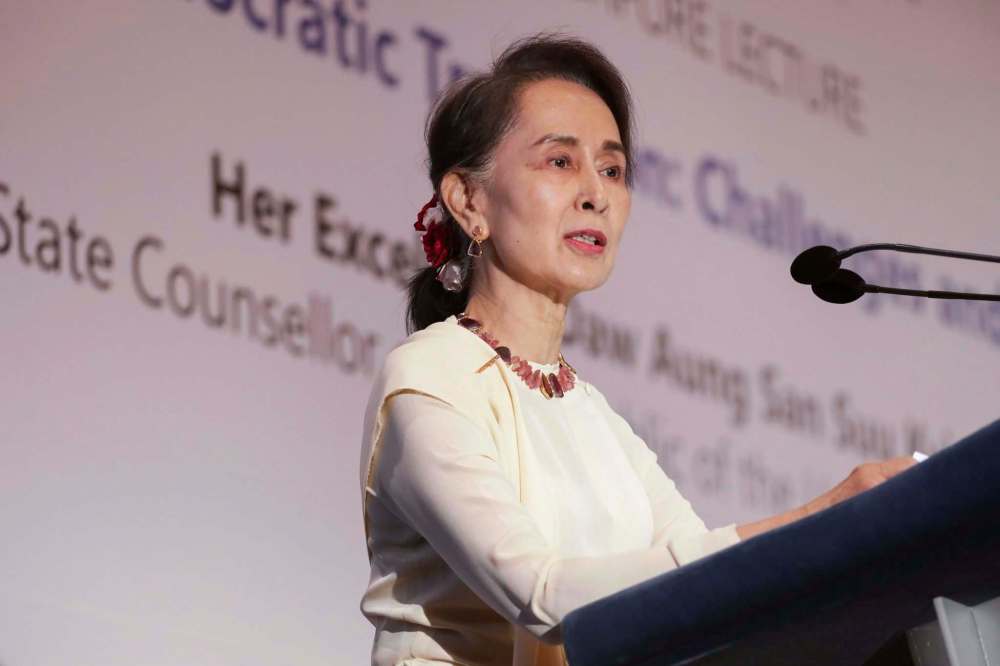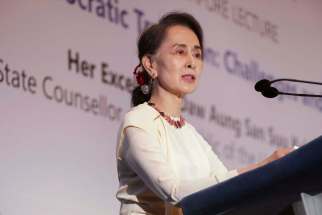Military coup clouds Myanmar’s future
Read this article for free:
or
Already have an account? Log in here »
To continue reading, please subscribe:
Monthly Digital Subscription
$0 for the first 4 weeks*
- Enjoy unlimited reading on winnipegfreepress.com
- Read the E-Edition, our digital replica newspaper
- Access News Break, our award-winning app
- Play interactive puzzles
*No charge for 4 weeks then price increases to the regular rate of $19.00 plus GST every four weeks. Offer available to new and qualified returning subscribers only. Cancel any time.
Monthly Digital Subscription
$4.75/week*
- Enjoy unlimited reading on winnipegfreepress.com
- Read the E-Edition, our digital replica newspaper
- Access News Break, our award-winning app
- Play interactive puzzles
*Billed as $19 plus GST every four weeks. Cancel any time.
To continue reading, please subscribe:
Add Free Press access to your Brandon Sun subscription for only an additional
$1 for the first 4 weeks*
*Your next subscription payment will increase by $1.00 and you will be charged $16.99 plus GST for four weeks. After four weeks, your payment will increase to $23.99 plus GST every four weeks.
Read unlimited articles for free today:
or
Already have an account? Log in here »
Hey there, time traveller!
This article was published 01/02/2021 (1778 days ago), so information in it may no longer be current.
Aung San Suu Kyi served for 10 years as a democratic fig leaf to cover the cruel and despotic military rulers of Myanmar (also known as Burma). The people of Myanmar, however, gave massive support to Ms. Suu Kyi and her National League for Democracy in Nov. 8 elections and turned their backs on the armed forces. Stung by the humiliation, the military masters this week locked her up once again and put themselves back in direct charge of the country.
Ms. Suu Kyi won worldwide admiration, expressed by her 1991 Nobel peace prize, during her house arrest between 1989 and 2010 while she preached non-violence to her followers. Her NLD had won the 1990 election in a landslide, but the military leaders clung to power and suppressed the NLD.
The admiration turned to dismay when Ms. Suu Kyi accepted a role in the military government. She appeared in 2019 before the International Court of Justice at The Hague and defended Myanmar’s rulers against charges they had committed genocide against the country’s Muslim Rohingya minority. The apostle of non-violence became an apologist for mass murder.

The people of Burma/Myanmar have lived under military rule for most of the time since the country won independence from Britain in 1948. They may not easily accept loss of the slightly enlarged freedom they have enjoyed since 2015 under the government of the National League for Democracy.
As Myanmar’s military rulers watch popular uprisings in Minsk and Moscow, they may find that despotism isn’t what it used to be. Alexander Lukashenko in Belarus and Vladimir Putin in Russia are already finding that abused and maltreated citizens are no longer intimidated by beatings, tear gas, imprisonment and torture that might formerly have bullied them into submission.
Because of her flirtation with her country’s despots, Ms. Suu Kyi no longer enjoys the former adulation outside Myanmar. Within the country, however, she remains a potent force. That was proven when her party won a landslide victory in the Nov. 8 elections. The army, whose supporters lost that election, took a leaf out of Donald Trump’s book and alleged widespread electoral fraud. Trump-like, they presented no evidence. They simply detained Ms. Suu Kyi and her colleagues and locked up the national assembly.
This fresh imprisonment may raise the tainted hero back up to her pedestal. Released now from justifying the despots before the world, she can return to tending the flame of democracy and holding out hope for a brighter future for Myanmar.
The watching world should not forget the role she played in relation to the Rohingya people. It should be noticed, however, that no one else has a solution, either: Rohingya refugees in Bangladesh refuse to return to the Myanmar killing fields from which they fled. Myanmar does not want them back. Bangladesh wants them gone, but the Muslim world has offered no help. Even Canada’s high-mindedness has not found them a safe place to live.
Ms. Suu Kyi remains Myanmar’s brightest hope for modernization and for expansion of civil rights and political freedoms. The country’s zig-zag path over the last half-century shows that progress is extremely slow and difficult against an entrenched and ruthless military dictatorship.
If Ms. Suu Kyi can find a way forward, even one that involves dancing with the military devils, democratic countries should cheer her on.











